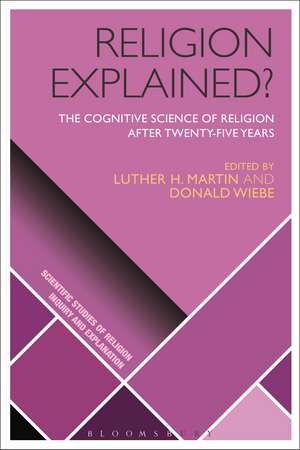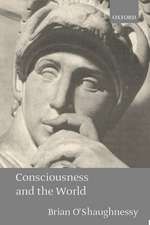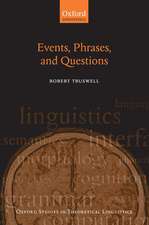Religion Explained?: The Cognitive Science of Religion after Twenty-five Years: Scientific Studies of Religion: Inquiry and Explanation
Editat de Luther H. Martin, Donald Wiebeen Limba Engleză Paperback – 20 mar 2019
| Toate formatele și edițiile | Preț | Express |
|---|---|---|
| Paperback (1) | 231.63 lei 6-8 săpt. | |
| Bloomsbury Publishing – 20 mar 2019 | 231.63 lei 6-8 săpt. | |
| Hardback (1) | 716.00 lei 6-8 săpt. | |
| Bloomsbury Publishing – 20 sep 2017 | 716.00 lei 6-8 săpt. |
Din seria Scientific Studies of Religion: Inquiry and Explanation
- 22%
 Preț: 149.02 lei
Preț: 149.02 lei - 23%
 Preț: 192.55 lei
Preț: 192.55 lei - 30%
 Preț: 511.64 lei
Preț: 511.64 lei - 23%
 Preț: 191.75 lei
Preț: 191.75 lei - 21%
 Preț: 218.65 lei
Preț: 218.65 lei - 21%
 Preț: 218.09 lei
Preț: 218.09 lei - 23%
 Preț: 229.41 lei
Preț: 229.41 lei - 13%
 Preț: 194.06 lei
Preț: 194.06 lei - 24%
 Preț: 190.16 lei
Preț: 190.16 lei - 21%
 Preț: 217.91 lei
Preț: 217.91 lei - 13%
 Preț: 237.57 lei
Preț: 237.57 lei - 24%
 Preț: 190.06 lei
Preț: 190.06 lei - 24%
 Preț: 190.06 lei
Preț: 190.06 lei - 23%
 Preț: 191.67 lei
Preț: 191.67 lei - 23%
 Preț: 191.38 lei
Preț: 191.38 lei - 22%
 Preț: 238.11 lei
Preț: 238.11 lei - 30%
 Preț: 596.81 lei
Preț: 596.81 lei - 22%
 Preț: 225.12 lei
Preț: 225.12 lei - 21%
 Preț: 217.82 lei
Preț: 217.82 lei - 22%
 Preț: 237.93 lei
Preț: 237.93 lei - 22%
 Preț: 256.20 lei
Preț: 256.20 lei - 23%
 Preț: 191.38 lei
Preț: 191.38 lei - 23%
 Preț: 255.66 lei
Preț: 255.66 lei - 30%
 Preț: 512.37 lei
Preț: 512.37 lei - 13%
 Preț: 257.03 lei
Preț: 257.03 lei - 30%
 Preț: 511.07 lei
Preț: 511.07 lei - 30%
 Preț: 717.79 lei
Preț: 717.79 lei
Preț: 231.63 lei
Preț vechi: 297.51 lei
-22% Nou
Puncte Express: 347
Preț estimativ în valută:
44.33€ • 46.11$ • 36.60£
44.33€ • 46.11$ • 36.60£
Carte tipărită la comandă
Livrare economică 14-28 aprilie
Preluare comenzi: 021 569.72.76
Specificații
ISBN-13: 9781350105928
ISBN-10: 1350105929
Pagini: 272
Ilustrații: 6 bw illus
Dimensiuni: 156 x 234 x 14 mm
Greutate: 0.39 kg
Editura: Bloomsbury Publishing
Colecția Bloomsbury Academic
Seria Scientific Studies of Religion: Inquiry and Explanation
Locul publicării:London, United Kingdom
ISBN-10: 1350105929
Pagini: 272
Ilustrații: 6 bw illus
Dimensiuni: 156 x 234 x 14 mm
Greutate: 0.39 kg
Editura: Bloomsbury Publishing
Colecția Bloomsbury Academic
Seria Scientific Studies of Religion: Inquiry and Explanation
Locul publicării:London, United Kingdom
Caracteristici
An evaluation of the contributions of the cognitive science of religion to the broader academic studies of religion, by leading international contributors
Notă biografică
Luther H. Martin is Professor of Religion Emeritus at the University of Vermont, USA. Donald Wiebe is Professor of Philosopy of Religion, Trinity College, University of Toronto, Canada.
Cuprins
List of contributors Introduction: Religion Explained? The Cognitive Science of Religion after Twenty-five Years, Luther H. Martin (University of Vermont, USA) and Donald Wiebe (University of Toronto, Canada) Part One: Retrospectives 1. The Cognitive Science of Religion and the Growth of Knowledge, E. Thomas Lawson (Queen's University, Belfast, UK) 2. Twenty-Five Years In: Landmark Empirical Findings in the Cognitive Science of Religion, Robert N. McCauley (Emory University, USA) 3. Twenty-Five Years of CSR: A Personal Retrospective, Harvey Whitehouse (University of Oxford, UK) 4. The Beautiful Butterfly: On the History and Prospects of the Cognitive Science of Religion, Uffe Schjødt & Armin W. Geertz (Aarhus University, Denmark) Part Two: State of the Art 5. Religion Explained? Some Variants of Cognitive Theory, Stewart Elliott Guthrie, (Fordham University, USA) 6. Cognitive Attractors in the Evolution and Diffusion of Religious Representations, Pascal Boyer (Washington University in St. Louis) & Nicolas Baumard (École Normale Supérieure Paris, France) 7. The Long Way from Cognitive Science to History: To Shorten the Distance and Fill in the Blanks, Panayotis Pachis & Olympia Panagiotidou (Aristotle University of Thessaloniki, Greece) 8. The Indispensability of Cognitive Science for a Genuine History of Religion, Anders Klostergaard Petersen (Aarhus University, Denmark) Part Three: CSR 2.0 9. Exiting the Motel of the Mysteries? How Historiographical Floccinaucinihilipilification Is Affecting CSR 2.0, Leonardo Ambasciano (Masaryk University, Czech Republic) 10. Minimal Counterintuitiveness Revisited, Again: The Role of Emotional Valence in Memory for Conceptual Incongruity, Micheala Porubanova (State University of New York, Farmingdale, USA) & John H. Shaver (Victoria University of Wellington) 11. Constraints on Theory-Building in the Cognitive Science of Religion with Reflections on the Influence of Physics Envy and the Principle of Sufficient Reason, Benson Saler & Charles A. Ziegler (Brandeis University, USA) 12. The Effects of Relative Stable Feedback Loops: Cognitive Science and Historical Explanations, Jesper Sørensen (Aarhus University, Denmark) Part Four: Looking Forward 13. The Road Not Taken: Possible Paths for the Cognitive Science of Religion, Richard Sosis (University of Connecticut, USA) 14. Looking Back to Look Forward: From Shannon and Turing to Lawson and McCauley to.?, Justin Lane (Boston University, USA) 15. A Neo-Victorian Cognitive Science of Religion, Steven Hrotic (Independent Scholar) Conclusion 16. On Keeping Cognitive Science of Religion Cognitive and Cultural, Justin L. Barrett (Fuller Theological Seminary, USA) Bibliography Index
Recenzii
A series of earnest and frank reflections by scholars, established within [cognitive science of religion], who write passionately about their hopes for the future of the field they have helped to build.
Key questions raised in the papers ... collectively form a rich dialogue about the past, present and future of CSR ... [An] exemplary collection.
Martin and Wiebe have put together an extraordinary collection of essays on the past, present, and future of the Cognitive Science of Religion. The result is a volume that is a must-have for anyone interested in the scientific study of the religious mind.
This volume offers a presentation of the field of the cognitive science of religion by some of its founders and finest experts and demonstrates that it has grown into a diverse and dynamically developing research paradigm.
It is fascinating to read the insights of scholars as they take stock of thisyouthful discipline, and consider its possible future directions. Luther Martinand Donald Wiebe have compiled a stimulating appraisal of many differentaspects of research in the cognitive science of religion, with thoughtfulreflections from both established and new practitioners in the field.
The cognitive science of religion (CSR) is based on the uncontroversial idea that scholars should strive to make their theories consistent. Though most humanities scholars believe in the life sciences, systematic efforts to integrate the life sciences with the cultural study of religion began only recently, through the rise of the CSR. Beyond simply summarising progress, this collection articulates the bold intellectual vision motivating this vibrant interdisciplinary field. For anyone who wants to understand how the scientific study of religion and the cultural study of religion have become mutually dependent, this book makes for essential reading.
It provides an interesting and informative range of perspectives on a movement that has reached something of a watershed in its development. The perspectives offered are scholarly, honest and critical, often probing deeply.
Key questions raised in the papers ... collectively form a rich dialogue about the past, present and future of CSR ... [An] exemplary collection.
Martin and Wiebe have put together an extraordinary collection of essays on the past, present, and future of the Cognitive Science of Religion. The result is a volume that is a must-have for anyone interested in the scientific study of the religious mind.
This volume offers a presentation of the field of the cognitive science of religion by some of its founders and finest experts and demonstrates that it has grown into a diverse and dynamically developing research paradigm.
It is fascinating to read the insights of scholars as they take stock of thisyouthful discipline, and consider its possible future directions. Luther Martinand Donald Wiebe have compiled a stimulating appraisal of many differentaspects of research in the cognitive science of religion, with thoughtfulreflections from both established and new practitioners in the field.
The cognitive science of religion (CSR) is based on the uncontroversial idea that scholars should strive to make their theories consistent. Though most humanities scholars believe in the life sciences, systematic efforts to integrate the life sciences with the cultural study of religion began only recently, through the rise of the CSR. Beyond simply summarising progress, this collection articulates the bold intellectual vision motivating this vibrant interdisciplinary field. For anyone who wants to understand how the scientific study of religion and the cultural study of religion have become mutually dependent, this book makes for essential reading.
It provides an interesting and informative range of perspectives on a movement that has reached something of a watershed in its development. The perspectives offered are scholarly, honest and critical, often probing deeply.















